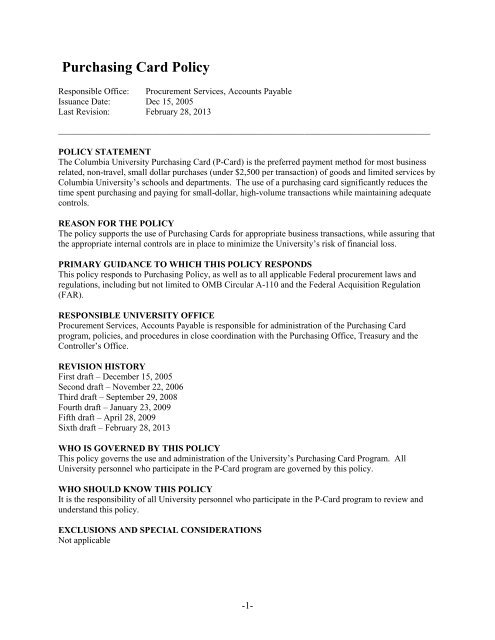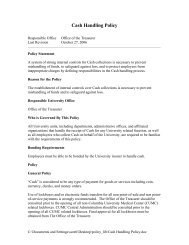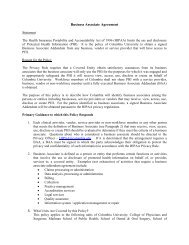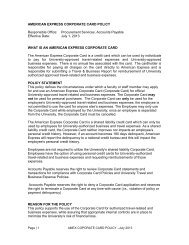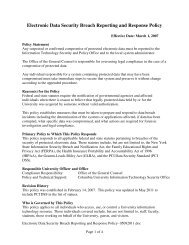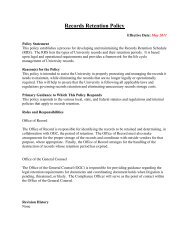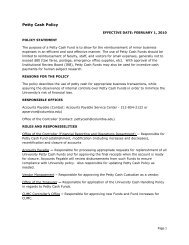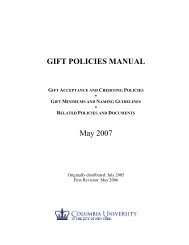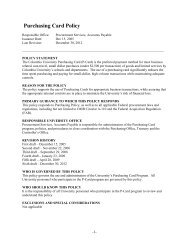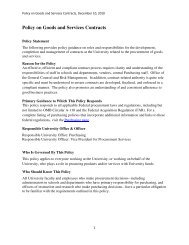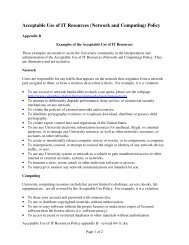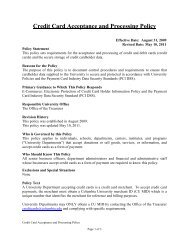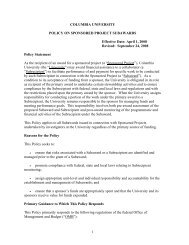Full policy - Columbia University Administrative Policy Library
Full policy - Columbia University Administrative Policy Library
Full policy - Columbia University Administrative Policy Library
You also want an ePaper? Increase the reach of your titles
YUMPU automatically turns print PDFs into web optimized ePapers that Google loves.
Purchasing Card <strong>Policy</strong><br />
Responsible Office: Procurement Services, Accounts Payable<br />
Issuance Date: Dec 15, 2005<br />
Last Revision: February 28, 2013<br />
____________________________________________________________________________________________<br />
POLICY STATEMENT<br />
The <strong>Columbia</strong> <strong>University</strong> Purchasing Card (P-Card) is the preferred payment method for most business<br />
related, non-travel, small dollar purchases (under $2,500 per transaction) of goods and limited services by<br />
<strong>Columbia</strong> <strong>University</strong>’s schools and departments. The use of a purchasing card significantly reduces the<br />
time spent purchasing and paying for small-dollar, high-volume transactions while maintaining adequate<br />
controls.<br />
REASON FOR THE POLICY<br />
The <strong>policy</strong> supports the use of Purchasing Cards for appropriate business transactions, while assuring that<br />
the appropriate internal controls are in place to minimize the <strong>University</strong>’s risk of financial loss.<br />
PRIMARY GUIDANCE TO WHICH THIS POLICY RESPONDS<br />
This <strong>policy</strong> responds to Purchasing <strong>Policy</strong>, as well as to all applicable Federal procurement laws and<br />
regulations, including but not limited to OMB Circular A-110 and the Federal Acquisition Regulation<br />
(FAR).<br />
RESPONSIBLE UNIVERSITY OFFICE<br />
Procurement Services, Accounts Payable is responsible for administration of the Purchasing Card<br />
program, policies, and procedures in close coordination with the Purchasing Office, Treasury and the<br />
Controller’s Office.<br />
REVISION HISTORY<br />
First draft – December 15, 2005<br />
Second draft – November 22, 2006<br />
Third draft – September 29, 2008<br />
Fourth draft – January 23, 2009<br />
Fifth draft – April 28, 2009<br />
Sixth draft – February 28, 2013<br />
WHO IS GOVERNED BY THIS POLICY<br />
This <strong>policy</strong> governs the use and administration of the <strong>University</strong>’s Purchasing Card Program. All<br />
<strong>University</strong> personnel who participate in the P-Card program are governed by this <strong>policy</strong>.<br />
WHO SHOULD KNOW THIS POLICY<br />
It is the responsibility of all <strong>University</strong> personnel who participate in the P-Card program to review and<br />
understand this <strong>policy</strong>.<br />
EXCLUSIONS AND SPECIAL CONSIDERATIONS<br />
Not applicable<br />
-1-
FORMS/POLICIES/PROCEDURES<br />
All Forms, Policies and Procedures for the P-Card program are available at<br />
http://finance.columbia.edu/procurement/p-card. These documents are frequently updated; so please<br />
check the website for the most current version.<br />
PROGRAM OVERVIEW<br />
A P-Card is a credit card that authorized <strong>University</strong> personnel may use to purchase goods and limited<br />
services for use by the <strong>University</strong>. P-Cards are issued to individuals who meet the appropriate<br />
requirements and can only be used by the individual named on the card. <strong>Columbia</strong> <strong>University</strong> is liable to<br />
the financial institution that issues the P-Cards for all valid transactions and pays the financial institution<br />
directly. P-Card transactions bring greater efficiency to the purchasing process because transactions can<br />
be made without a purchase order and payment is streamlined.<br />
The <strong>University</strong> has chosen a Purchasing Card program offered through a card-issuing Financial Services<br />
Provider (“Card Issuer”). This program is governed by the terms and conditions of a Master Agreement<br />
between <strong>Columbia</strong> <strong>University</strong> and the Card Issuer. The Card Issuer provides a web-based system to<br />
manage the Program.<br />
P-CARD ROLES AND RESPONSIBILITIES<br />
ACCOUNTS PAYABLE<br />
Procurement Services, Accounts Payable administers the P-Card Program, and is responsible for<br />
supporting schools and departments in utilizing the Program to execute and pay for small<br />
purchases in an effective, efficient and appropriately controlled manner. Procurement Services,<br />
Accounts Payable is solely authorized to make any modifications or exceptions to the program<br />
and to perform administrator tasks such as setting-up users, changing card controls, etc., in the<br />
card management system and ARC. Procurement Services, Accounts Payable maintains all forms<br />
and policies and procedures directly associated with the program. Procurement Services,<br />
Accounts Payable is responsible for developing, updating and administering all audit and<br />
disciplinary policies related to the P-Card program. Procurement Services, Accounts Payable will<br />
approve payment of the monthly card charges based on the bill from the Card Issuer and the<br />
information in the card management system and ARC.<br />
CARDHOLDER<br />
Authorized <strong>University</strong> personnel who make frequent, low-dollar purchases for <strong>University</strong><br />
business and are issued a P-Card will hold the role of Cardholder. A Cardholder makes<br />
purchases, has a legitimate business purpose for all P-Card transactions, regularly reviews his or<br />
her transactions, allocates transactions to the correct accounting codes, provides a business<br />
purpose when necessary, and maintains their P-Card receipts for review and audit purposes.<br />
P-CARD RECONCILER<br />
A Reconciler is the person to whom the Cardholder has delegated all the functions associated<br />
with post-purchase processing in the ARC including account allocation and providing a business<br />
purpose when required. The Reconciler role can be given to either the cardholder or<br />
assigned to a proxy to reconcile on the cardholder’s behalf. A Reconciler CANNOT make<br />
purchases using the card belonging to the Cardholder for whom they reconcile. The Cardholder is<br />
responsible for all actions taken by the Reconciler on his or her behalf.<br />
-2-
P-CARD REVIEWER<br />
A Reviewer reviews P-Card transactions for a cardholder(s). This role is view only and<br />
will not have the ability to either reconcile or approve transactions.<br />
APPROVER<br />
An Approver is the person who approves purchases that have been made by the Cardholder(s) to<br />
which he or she is assigned. By approving each transaction, the Approver exercises critical<br />
control by ensuring authorized and appropriate P-Card use and correct allocation of expenses in<br />
accordance with Accounts Payable, Purchasing and other related <strong>University</strong> policies. Approvers<br />
should also review receipts where appropriate to ensure compliance with this and other<br />
<strong>University</strong> policies. An Approver must have DAF voucher approval authority of $2,500 or<br />
greater.<br />
No Cardholder may approve his or her own purchases/transactions nor may he or she direct<br />
someone else to approve transactions in a manner that would violate <strong>policy</strong>, i.e., without<br />
reviewing the transactions in detail, etc. As a general rule, the Approver should not report to the<br />
Cardholder whose transactions he or she is reviewing.<br />
DEPARTMENTAL P-CARD ADMINISTRATOR (DPAD)<br />
A Departmental P-Card Administrator is responsible for ensuring that his or her school or<br />
department follows the policies and procedures for the P-Card program. A Departmental P-Card<br />
Administrator is also the primary liaison between Procurement Services, Accounts Payable and<br />
the P-Card program participants in his or her department or school. He or she manages and<br />
approves the documentation related to new card applications and changes in cardholder<br />
information (name, mailing address, increase or decrease in limits, etc.) or employment status.<br />
The Departmental P-Card Administrator should conduct a regular review of transactions for<br />
compliance with P-Card policies and procedures. The Departmental P-Card Administrator is also<br />
responsible for working with Procurement Services, Accounts Payable and/or their senior<br />
management to administer all disciplinary policies for his or her P-Card participants. The<br />
Departmental P-Card Administrator can request that a card be terminated by the P-Card staff at<br />
any time.<br />
SENIOR FINANCIAL ADMINISTRATORS OF SCHOOLS AND DEPARTMENTS<br />
The Senior Financial Administrator of a school or department is responsible for overall<br />
monitoring of their school or departments Purchasing Card program to ensure compliance with all<br />
policies and procedures and is responsible for administering the disciplinary policies for their<br />
participants.<br />
Please note: It is possible for one person to hold more than one role; however, Cardholders cannot<br />
approve their own transactions.<br />
P-CARD CARDHOLDER AND APPROVER AUTHORIZATION<br />
Authorization to hold a P-Card and approve P-Card transactions is governed by the <strong>University</strong>’s internal<br />
DAF <strong>policy</strong> via the DAF system. Please review the DAF <strong>policy</strong> at<br />
http://<strong>policy</strong>library.columbia.edu/departmental-authorization-function<br />
SPECIAL CONCERNS ABOUT CHARGES TO GRANTS AND CONTRACTS<br />
While the P-Card may be used to make purchases and thereby incur related charges on grants and<br />
contracts, special efforts are required to insure that the charges themselves are permissible in accordance<br />
-3-
with the terms of those grants and contracts. Please review related policies and procedures governing<br />
grants and restricted funds at the Controller’s website at http://finance.columbia.edu/content/sponsoredprojects-finance.<br />
REVIEWING AND MONITORING TRANSACTIONS<br />
Periodic reviews of each Cardholder’s records (i.e., Cardholder receipts and other supporting documents)<br />
will be performed by Internal Audit, Procurement Services, the <strong>University</strong>’s financial auditors or others<br />
who perform audits on the <strong>University</strong>’s behalf as well as external auditors and federal, regulatory and<br />
other granting agencies.<br />
RESTRICTED ITEMS<br />
While the P-Card may be used to purchase most goods and limited services, some items are not<br />
permitted to be purchased when using a P-Card because the commodities/items require<br />
additional oversight or control in advance of the purchase.<br />
The P-Card also cannot be used for the purchase of goods and services that require governmental<br />
licenses or permissions or that are controlled under U.S. export controls. Export controls refer<br />
to items (A) identified as “defense articles” under the U.S. International Traffic in Arms<br />
Regulations (“ITAR”) of the Department of State or (B) assigned an Export Classification<br />
Number (“ECCN”) entry on the U.S. Commerce Control List of the Export Administration<br />
Regulations (“EAR”). Examples of export-controlled items include certain navigation systems,<br />
protective equipment, underwater sound equipment, lasers, encryption software, and night vision<br />
goggles. For assistance in determining whether an item is export-controlled, please coordinate<br />
with your departmental administration, who will in turn seek advice from central administration<br />
resources as needed.<br />
Please refer to Appendix A to see additional examples of items that ARE NOT approved for purchase<br />
using the P-Card. This list is not all-inclusive; if there are any questions about whether or not the P-Card<br />
can be used for a purchase, please contact the P-Card staff at pcard@columbia.edu or the Finance Service<br />
Center at 212-854-2122.<br />
P-CARD MISUSE<br />
Misuse of the P-Card and violation of the P-Card <strong>policy</strong> will result in disciplinary action. Examples of<br />
misuse and <strong>policy</strong> violation include, but are not limited to:<br />
Misuse<br />
Purchase of items for personal use<br />
Purchase of restricted commodities<br />
Splitting of purchase or service cost over multiple card transactions in order to circumvent the single<br />
transaction limit<br />
Use of the card by anyone or any department other than the authorized cardholder<br />
<strong>Administrative</strong> Violations<br />
Failure to obtain and maintain supporting documentation for all card transactions<br />
Failure of Cardholder and/or Approver to sign off on transactions by hard close deadline<br />
Lack of timely and proper reconciliation of posted transactions<br />
Allocation of charges to sponsored project accounts in a manner that is inconsistent with federal or<br />
other guidelines<br />
Approval of transactions that violate <strong>University</strong> policies<br />
-4-
If any P-Card participant violates the P-Card policies and procedures, the participant may be subject to<br />
sanctions including suspension of the card program privileges, card cancellation, and other disciplinary<br />
action as deemed appropriate by the <strong>University</strong>.<br />
REQUIREMENTS FOR P-CARD ISSUANCE AND ACTIVATION<br />
To obtain a P-Card, the applicant must complete the appropriate documents as specified in<br />
the Cardholder Procedures http://finance.columbia.edu/procurement/p-card<br />
The single transaction limit that is assigned to a Cardholder must be within the approving<br />
manager’s DAF authority.<br />
Every participant must complete the appropriate P-Card training before the card and ARC<br />
will be available for use. Cardholders will receive their P-Card at the conclusion of training.<br />
The Purchasing Card Receipt Form must be signed by the Cardholder when they receive their<br />
P-Card.<br />
SECURING P-CARD INFORMATION<br />
The P-Card and all account information should be kept in a secure place, and the card number should not<br />
be posted, emailed or visible in any place that is accessible by others. Each Cardholder is directly<br />
responsible for the physical security of their card and account information.<br />
REPORTING LOST, STOLEN OR COMPROMISED CARD INFORMATION<br />
If the P-Card is lost or stolen, the Cardholder must immediately notify the following:<br />
Card Issuer by calling the 1-888-449-2273 Approver<br />
Departmental P-Card Administrator<br />
P-Card staff (pcard@columbia.edu) or the Finance Service Center at 212-854-2122<br />
The account will automatically be closed and every effort will be made to have a new account opened<br />
within one week after notification. The <strong>University</strong> is liable for all unauthorized use of the card until the<br />
Card Issuer is notified. All charges associated with a card will be allocated to the department to which the<br />
Cardholder was assigned when the card was issued.<br />
CARD TERMINATION<br />
P-Cards are the property of <strong>Columbia</strong> <strong>University</strong> and the Card Issuer and can be terminated at any time by<br />
either the <strong>University</strong> or the Card Issuer. Cardholder or Approver security access must be removed<br />
through the ARC Security process as well as notification sent to the P-Card staff. <strong>University</strong> personnel<br />
who become aware of personal misuse should notify the P-Card staff immediately. P-Cards may be<br />
suspended or deactivated for the following reasons:<br />
Inactivity - Cardholders that have not used their P-Card for a period of six consecutive months<br />
will be notified by email that they should use their P-Card within the next month. If the P-Card is<br />
not used within a month the P-Card will be suspended. If the Cardholder does not request that the<br />
P-Card be reactivated within 6 months of the suspension date, the P-Card team will cancel the P-<br />
Card.<br />
P-Card Misuse – see page 4<br />
Cardholder moves to a new department in the <strong>University</strong> - If a Cardholder transfers to another<br />
-5-
department, the P-Card must be turned over to the Departmental P-Card Administrator and the<br />
account will be closed. The department will be held responsible for all charges made on the card<br />
until it has been canceled and Procurement Services, Accounts Payable has been notified. If a<br />
Cardholder needs a P-Card in his or her new department, he or she should follow the procedures<br />
for establishing a new Cardholder.<br />
Cardholder leaves the <strong>University</strong> - When a Cardholder leaves the <strong>University</strong>, the P-Card must<br />
be turned over to the Departmental P-Card Administrator and the account permanently closed.<br />
If a Cardholder believes a card has been suspended or cancelled in error, he or she should contact the<br />
Departmental P-Card Administrator immediately.<br />
USING THE P-CARD TO PURCHASE GOODS<br />
Cardholders are strongly encouraged to use the <strong>University</strong>’s preferred vendors (UwPA’s) for their P-Card<br />
Purchases. For the most current list of UwPA’s please visit the Purchasing website. Procurement<br />
Services, Accounts Payable will review P-Card transactions on a regular basis to analyze preferred vendor<br />
utilization and will review any resulting opportunities with the Departmental P-Card Administrator.<br />
Procurement Services, Accounts Payable will also work with the Card Issuer and VISA to encourage<br />
vendors who do not accept credit cards to add cards as a payment method.<br />
All purchases must be made in accordance with applicable laws and regulations, including, but not<br />
limited to <strong>Columbia</strong> <strong>University</strong>’s policies and procedures, which can be found on the Finance Gateway at<br />
http://finance.columbia.edu/policies.<br />
Purchases can ONLY be made by the person to whom the card is issued. Any other use is a violation of<br />
<strong>University</strong> <strong>Policy</strong>, and the person to whom the card is issued as well as the unauthorized user may be<br />
subject to disciplinary action.<br />
The following are some common examples of approved items for purchase using the P-Card.<br />
Books<br />
Minor computer equipment, software, and supplies Lab supplies and minor<br />
equipment )<br />
Registrations for conferences and seminars<br />
Subscriptions and memberships<br />
Professional membership and license fees<br />
Supplies and materials<br />
Postage<br />
Newspaper, journal, on-line advertising fees<br />
The P-Card may also be used to procure some types of non-consultant services. In general, nonconsultant<br />
services may be purchased via the P-Card so long as they are governed by a <strong>University</strong>-wide<br />
Purchasing Agreement (UwPA), or where they do not require contractual or purchase order terms and<br />
conditions binding the <strong>University</strong> or the vendor. (Please note: most repairs and services not governed by a<br />
UwPA require a PO so please contact the P-Card team at pcard@columbia.edu or the Finance Service<br />
Center at 212-854-2122 if you are uncertain if your P-Card can be used for a purchase.) Schools and<br />
departments are encouraged to charge the following services where appropriate:<br />
Couriers<br />
Overnight air and ground delivery (via UwPA)<br />
Medical transcription (via UwPA)<br />
-6-
Medical Answering services (via UwPA)<br />
Cell phone and pager charges (via UwPA)<br />
Water and Coffee deliveries (via UwPA)<br />
Record Storage (via UwPA)<br />
Other metered services<br />
Please note, all invoices and/or bills must identify <strong>Columbia</strong> <strong>University</strong> as the “Bill-To” and the<br />
bill-to and shipping address must be a <strong>Columbia</strong> <strong>University</strong> address.<br />
This list is not all-inclusive; if there are any questions about whether or not the P-Card can be used for a<br />
purchase, please visit the P-Card website at http://finance.columbia.edu/procurement/p-card or the<br />
Purchasing Guide at http://finance.columbia.edu/purchasing-guide for a more inclusive list of acceptable<br />
uses.<br />
While schools and departments are encouraged to use the P-Card for most small purchases of goods, as<br />
well as appropriate services, some purchases may not be made via P-Card because they require additional<br />
oversight or control in advance of purchase. Please refer to Appendix A to see examples of items that<br />
ARE NOT approved for purchase using the P-Card. This list is not all-inclusive; if there are any<br />
questions about whether or not the P-Card can be used for a purchase, please contact the P-Card staff at<br />
pcard@columbia.edu or the Finance Service Center at 212-854-2122.<br />
P-CARD USE FOR ON-CAMPUS FOOD PURCHASES<br />
The P-Card may be used (with DPAD approval) to make small purchases of food from local food<br />
merchants for consumption at a work-related meeting or class at a <strong>University</strong>-owned or leased property.<br />
Such purchases may not include catering services that involve execution of a contract by the <strong>University</strong><br />
and/or provision of labor by a vendor at an event. The P-Card may not be used to purchase food while<br />
traveling on <strong>University</strong> business or for meals eaten in a restaurant or eating establishment. For all food<br />
purchases made under this <strong>policy</strong> the following information must be entered into ARC when reconciling<br />
transactions:<br />
Purpose of the event or meeting<br />
Type of meal (breakfast, lunch or dinner)<br />
Date and location of the event or meeting<br />
Names of attendees (or a number if there are more than 10 names)<br />
Cost per person<br />
All such purchases should be consistent with the <strong>University</strong>’s policies with respect to cost per person and<br />
any other related provisions. Please refer to the Travel & Business Expense policies<br />
http://finance.columbia.edu/policies. In addition, Reconcilers are required to scan and attach all receipts<br />
to P-Card food transactions in ARC.<br />
P-CARD USE WITH NYC PREFERRED VENDOR HOTELS<br />
The P-Card may be used (with DPAD approval) to make business-related hotel reservations at approved<br />
preferred local hotel vendors. For a list of current hotel vendors please visit the Purchasing website<br />
http://finance.columbia.edu/content/travel-services-local-preferred-hotel-rooms-university-guests-andvisitors.<br />
The P-Card may not be used with any other hotel. All payments at a preferred local hotel vendor<br />
must have the following information entered into ARC when reconciling transactions:<br />
Name of the guest<br />
Dates of the stay (check in and check out dates)<br />
Business purpose of the stay<br />
-7-
Cost per day<br />
Cardholders must also maintain a copy of the itemized hotel portfolio detailing all the charges as<br />
documentation for the purchase. In addition, Reconcilers are required to scan and attach all receipts to<br />
P-Card hotel transactions in ARC. All such purchases should be consistent with the <strong>University</strong>’s policies<br />
with respect to cost per person and any other related provisions. Please review to the Travel & Business<br />
Expense policies at http://finance.columbia.edu/policies.<br />
CARD RESTRICTIONS - SPENDING LIMITS<br />
The P-Card has both a “Single Transaction Limit” and a “Monthly Credit Limit” which is determined by<br />
the Cardholder’s Departmental P-Card Administrator (DPAD). The Single Transaction Limit is set at<br />
$2,500 or lower based on the amount the Cardholder is authorized to spend on each P-Card transaction.<br />
The single transaction limit cannot exceed $2,500. The Monthly Credit Limit is set to the total dollar<br />
amount that the Cardholder will spend on business related items within a month. With the exception of<br />
increasing the Single Transaction Limit above $2,500, these limits may be changed where appropriate and<br />
only when approved by the DPAD.<br />
It is explicitly prohibited for a Cardholder to “split” the purchase of merchandise in order to circumvent<br />
the “Single Transaction Limit”. Intentionally doing so may result in the immediate cancellation of the P-<br />
Card. A transaction includes the purchase price, sales tax (if applicable), and freight and/or handling.<br />
Any transaction that exceeds the Single Transaction Limit will be rejected by the merchant.<br />
All transactions during the billing period in excess of the Monthly Credit Limit before the end of the<br />
billing cycling will be rejected by the merchant. In the event this occurs and there was an exceptional<br />
and/or urgent circumstance, the Cardholder or the Departmental Program Administrator may call the P-<br />
Card staff to review any available options.<br />
SALES TAX<br />
Cardholders should remind vendors at the time of purchase that according to the tax laws in some states,<br />
the <strong>University</strong> is exempt from sales tax. For a list of states that honor the <strong>University</strong>’s tax-exempt status<br />
please contact the Finance Service Center at 212-854-2122 or<br />
http://finance.columbia.edu/content/finance-service-center. The <strong>University</strong>’s tax exempt number is<br />
printed on the P-Card and Cardholders should keep a copy of the tax-exempt form with them to present to<br />
the vendor at the time of purchase. To request a copy of the <strong>University</strong>’s tax-exempt form, please contact<br />
the Service Center at 212-854-2122 or http://finance.columbia.edu/content/finance-service-center. If a<br />
Cardholder is charged sales tax for a P-Card purchase that should be tax-exempt, the Cardholder should<br />
contact the vendor directly and request a credit.<br />
TRANSACTION REVIEW<br />
It is the Cardholder and Approver’s responsibility to review all transactions for accuracy, appropriate<br />
business purpose, reconcile with invoices/receipts/records, assign proper accounting, and sign-off on all<br />
P-Card transactions as quickly as possible after the purchase. It is strongly recommended that this be<br />
completed once a week, but must be to be completed by the hard close. The Cardholder and Approver<br />
should review each transaction to ensure compliance with the following items:<br />
All transactions made using the card comply with the <strong>University</strong>’s Accounts Payable, Purchasing<br />
and P-Card Policies, http://finance.columbia.edu/policies<br />
All purchases must have a valid <strong>University</strong> business purpose<br />
-8-
Accounting is done in compliance with the <strong>University</strong>’s Accounting Policies<br />
http://finance.columbia.edu/policies<br />
Purchases meet all grant or regulatory requirements (if the purchase is allocated to a grant or<br />
federally funded account)<br />
All required receipts are accounted for and are maintained in accordance with this <strong>policy</strong><br />
RECEIPT MANAGEMENT<br />
It is the Cardholder’s responsibility to maintain receipts that document the nature and cost of all purchases<br />
made with a P-Card in accordance with <strong>University</strong> Finance retention policies.<br />
RECEIPT DEFINITION<br />
A receipt generally includes the following information:<br />
Purchase date [ex. 06/15/06];<br />
Vendor name [ex. Poland Spring Water];<br />
Item(s) description [ex. Case of 24 bottles of water];<br />
Quantity [ex. 2];<br />
Unit price [ex. $6.98]; and<br />
Total charge [ex. $13.96]<br />
If this information is not on the receipt, the Cardholder should write that information on it. A receipt can<br />
be in the form of a cash register receipt, a copy of an order form (i.e., for subscriptions or conference<br />
registrations), or a web receipt or email acknowledgement from the vendor. The receipt should provide<br />
sufficient detail to support the business purpose of the purchase.<br />
Occasionally, the Cardholder may lose a receipt. The Cardholder should document the details about the<br />
purchase including date, vendor name, item(s) description, quantity, unit price and total charge. The<br />
Cardholder should sign the document.<br />
RETURNS AND/OR CREDITS<br />
If goods purchased with the P-Card need to be returned, the Cardholder must contact the vendor directly<br />
and request a credit to their P-Card or <strong>University</strong> account. This <strong>policy</strong> prohibits any other type of credit<br />
including cash.<br />
DISPUTING TRANSACTIONS<br />
Cardholders must attempt to resolve all disputes directly with the vendor. If the Cardholder cannot<br />
resolve the issue with the vendor, the Cardholder should dispute the transaction with Bank of America.<br />
Please see the P-Card Procedure for how to dispute a transaction. Once a good faith effort has been made<br />
to resolve a problem with a vendor, the transaction can be disputed through the Card Issuer.<br />
Sales tax may not be disputed and must always be addressed directly with the vendor.<br />
In accordance with our agreement with the Card Issuer, a dispute MUST be initiated NO LATER<br />
THAN 60 days after the date of the transaction. Failure to do so will result in the dispute being<br />
rejected and the <strong>University</strong> and corresponding department will be responsible for the charges.<br />
-9-
Appendix A<br />
The following is a list of items that CANNOT be purchased on the P-Card. This list is not all-inclusive;<br />
if there are any questions about whether or not the P-Card can be used for a purchase, please contact the<br />
P-Card staff at pcard@columbia.edu or contact the Finance Service Center at 212-854-2122.<br />
Personal items<br />
Items requiring governmental licenses or permissions or that are<br />
controlled under U.S. export controls<br />
Split transactions*<br />
Alcohol (beverage or otherwise)<br />
Travel (airline, car rental, lodging, taxi, car services, shuttle buses, etc.)<br />
Entertainment (movie tickets, sporting event tickets, etc.)<br />
MetroCards, purchased for any reason<br />
Food eaten off-campus for any reason (meals, receptions, etc.)<br />
Food purchased for on-campus meetings where the P-Card was not approved for<br />
this type of use (see Cardholder Procedures section IV.D.)<br />
Flowers, greeting cards, candy, fruit baskets<br />
Purchases from Edible Arrangements<br />
Gifts of any kind<br />
Gift cards and gift certificates of any kind for any reason<br />
Any promotional items with <strong>University</strong> Logo or trademark not purchased thru an<br />
approved Licensed Vendor<br />
Fines of any kind<br />
Purchases using personal PayPal accounts<br />
Maintenance and Service agreements<br />
On-site Equipment repairs<br />
Cash advances, cash back on purchases, cash refunds on returns<br />
Controlled substances<br />
Live animals<br />
Radioactive materials and specialty gases<br />
Contracted services from an individual or 1099 vendors<br />
Honorariums<br />
Furniture<br />
Fuel<br />
Leases /Rentals<br />
Insurance<br />
Employee relocation and relocation related expenses<br />
Moving services<br />
Catering<br />
Parking<br />
Charitable Contributions<br />
Fees for Foreign Nationals of any kind (Visa’s etc.)<br />
Online auctions (i.e. EBAY)<br />
* Cardholders are not permitted to divide a purchase into multiple transactions to avoid their single<br />
transaction limit. An example of a split transaction would be the following scenario: Total purchase is<br />
$3000 and the Cardholder has a single transaction limit of $2500. The Cardholder has the vendor split the<br />
order into amounts of $1000, $1000 and $1000 so the original transaction is not declined.<br />
-10-


